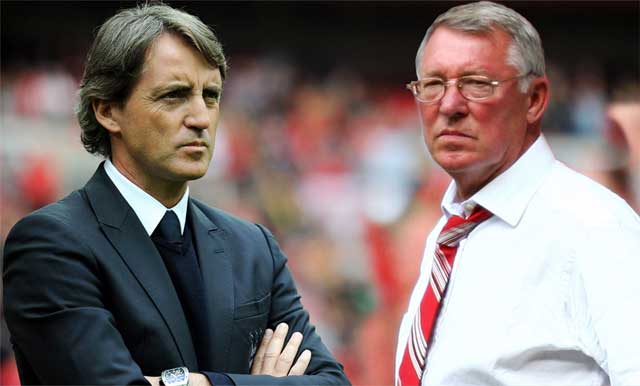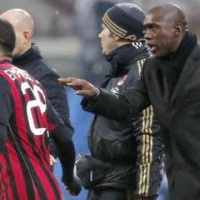It is commonly said that when you reach the highest level, coaching at the a top club is all about managing the fragile egos and getting the best out of your players when it matters most.

Sir Alex Ferguson vs Mancini
And at some of the massive clubs like Real Madrid, Manchester City, and Chelsea these teams literally carry enough top quality stars to fill two teams. The trick of keeping all of them happy and ready to play when they are called upon is an art form. To be a successful manager you need to have it, if you don’t, dissension, unhappiness, and general upheaval within the ranks will lead to a short tenure as a coach. And with the top players often being the most enigmatic, strong willed and opinionated, your management skills had better be sharp.
The managers that don’t get it right, no matter how great their tactical nuance or brilliance, they’re time at a club will be short-lived. The coach or the player is destined to burn out due to the constant turbulence surrounding the team. There is no magic formula or template as how to be successful at managing your players. With more circumstances being involved in a modern footballers life, whether its money, agents and inflated egos, the old method of threatening to sell or sack players is no longer effective.
In this past weekends Manchester Derby we saw two coaches at completely different ends of the man-management spectrum, Manchester United manager Sir Alex Ferguson at one end, and City manager Roberto Mancini at the other.
They both have distinctly different styles. Sir Alex Ferguson, who in his time at Manchester United has dealt with characters as diverse, individual and far ranging as David Beckham, Eric Cantona, Cristiano Ronaldo and Roy Keane to name a few. All with their own enigmatic ways and on separate occasions each had their own massive fall-outs with Sir Alex, but at the end of it, the manager has found a way to make it work to where, long after those individual players careers are over, they still share a positive relationship with the coach.
Currently at Manchester City, Mancini’s approach is different. Mancini seems to thrive on conflict and as a result there seems to be constant dissension swirling around the City camp, with players either fighting each other or voicing their opinions about their lack of playing time or arguments with the manager.
This past weekend his interactions with Mario Balotelli were high-lighted especially as the player was substituted, where Mancini refused to look at or even acknowledge Balotelli. Instead, Mancini, seemed to utter a few choice words for him in Italian as Balotelli descended down the tunnel, and in response Balotelli offered a few back. An ugly scene.
In the after game press conference, Mancini was openly critical of his players to the point of blaming them for their play and for losing the game.
Ferguson on the other hand always protects his players in the media deciding to keep his thoughts and feelings personal and within the confines of the club, and when a player is substituted he is always their to offer a hand shake for the players effort. These small gestures go along way towards gaining loyalty and trust within the camp.
Mancini’s approach although it may be effective, its effect is short-term and will ultimately drive a wedge between him and his players.
The constant rows and arguments that typically hover around the Manchester City camp are an extension of the coaches demeanor and overall attitude. He creates an abrasive and confrontational camp which spills over to the team, while at United its the reverse. The loyalty and trust that Ferguson creates within his camp has served him well in his tenure at United and ultimately it’s those same traits that will get you through the rough patches.
The Premiership title looks like its going to be a race between City and Untied, odds are on that the most spirited and most cohesive team will win the championship. It just might come down to man-management.























Pingback: เกมส์()